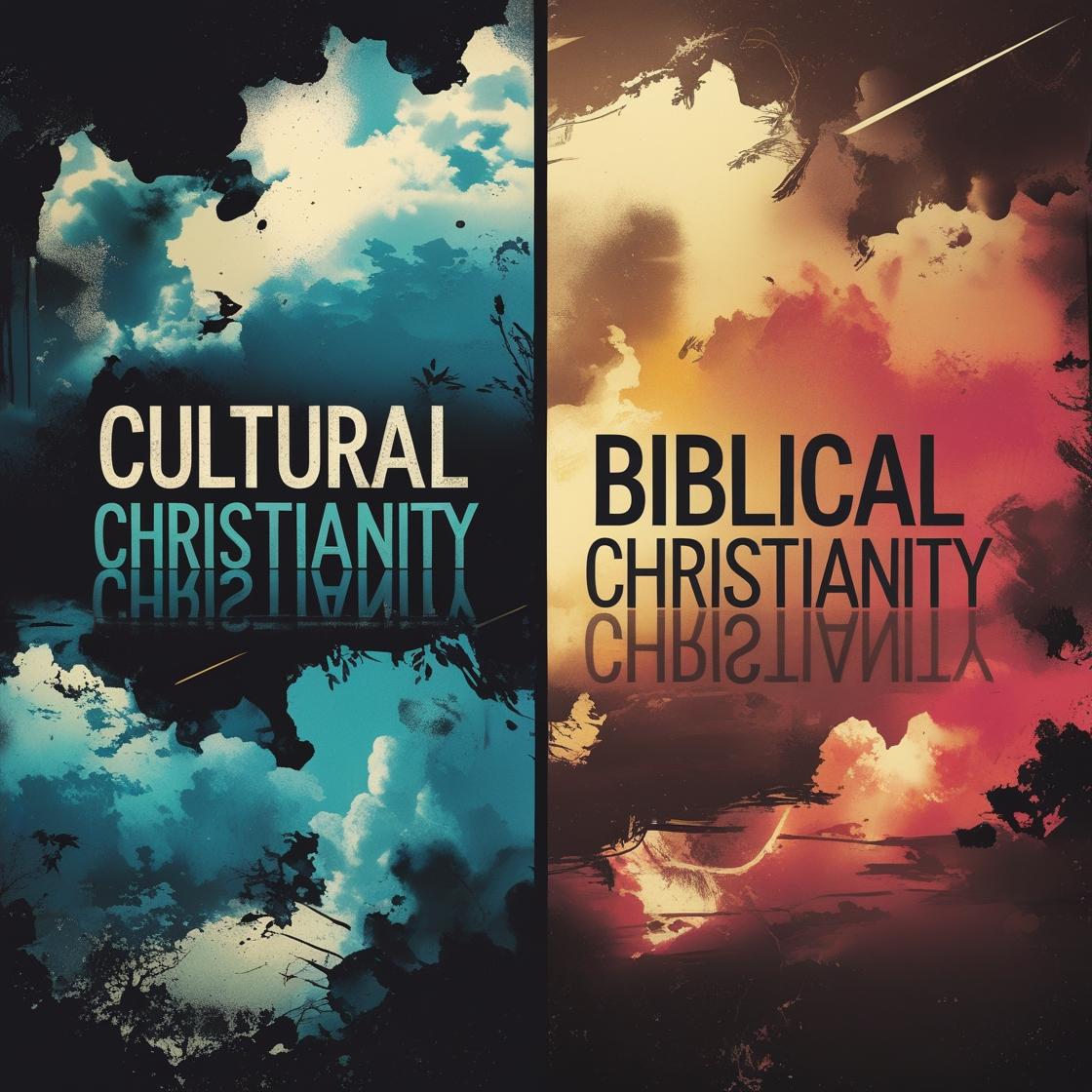Cultural Christianity vs. Biblical Christianity: What’s the Difference?
I believe you must have read about Biblical Christianity and Cultural Christianity, but if you have not, feel free to visit and read them later
You see, Christianity is more than a label; it’s a life-changing relationship with Jesus Christ. But in today’s world, many people identify as “Christian” without truly understanding what that means. Some even embrace it as a cultural identity (the president of Belarus, Alexander Lukashenko, has identified as a cultural Christian, calling himself an “Orthodox atheist” in one of his interviews, and the current president of France, Emmanuel Macron, identified himself as an “agnostic Catholic”); while others (Biblical Christians) live it out as a deep, personal faith.
So, how can we distinguish between Cultural Christianity (a surface-level, inherited, or socially driven faith) and Biblical Christianity (a genuine, transformative relationship with God)?
Below is a clear breakdown of the key contrasts between the two so that we know where we stand in faith.
1. Foundation of Belief
- Cultural Christianity is based on traditions, ancestry, family upbringing, or national identity. It’s often more about heritage than personal conviction.
- Biblical Christianity is rooted in a personal faith in Jesus Christ, repentance from sin, and surrender to God’s infinite will (John 3:16; Acts 2:38).
2. Motivation for Faith
- Cultural Christianity is driven by social acceptance, family expectations, or a sense of moral superiority.
- Biblical Christianity is motivated by love for God, gratitude for salvation, and a desire to follow Christ (Matthew 22:37; 2 Corinthians 5:14-15).
3. View of the Bible
- Cultural Christianity sees the Bible as a moral guidebook or historical text but doesn’t submit to its final authority. May pick and choose what to believe.
- Biblical Christianity accepts Scripture as God’s inspired Word and seeks to live by its teachings (2 Timothy 3:16-17; Psalm 119:105).
4. Approach to Salvation
- Cultural Christianity assumes that being a good person, attending church, or being born into a Christian family is enough for salvation.
- Biblical Christianity recognizes that salvation comes only through faith in Jesus’ death and resurrection (Ephesians 2:8-9; John 14:6).
5. Lifestyle & Priorities
- Cultural Christianity shows us that one’s faith doesn’t significantly impact daily life. Such people may attend church occasionally but live no differently than the world.
- Biblical Christianity strives to live a Christ-centered life, bearing spiritual fruit (Galatians 5:22-23) and turning away from sin daily (Romans 12:2).
6. Relationship with Jesus
- Cultural Christianity views Jesus as a historical figure, moral teacher, or “good luck charm” rather than Lord and Savior.
- Biblical Christianity sees Jesus as the Son of God, personal Redeemer, and King of their life (Romans 10:9; Luke 9:23).
7. Response to Sin
- Cultural Christianity downplays sin, ignores conviction, or excuses wrongdoing because “nobody’s perfect.”
- Biblical Christianity takes sin seriously, repents, and relies on God’s grace for transformation (1 John 1:9; Romans 6:1-2).
8. Engagement with the Church
- Cultural Christianity attends church out of habit, social obligation, or tradition but isn’t committed to spiritual growth or community.
- Biblical Christianity actively participates in the body of Christ, serves others, and grows in faith (Hebrews 10:24-25; 1 Corinthians 12:27).
9. Attitude Toward Evangelism
- Cultural Christianity keeps faith private, avoids spiritual conversations, and may even be ashamed of the Gospel.
- Biblical Christianity shares the Gospel with love and boldness, desiring others to know Christ (Matthew 28:19-20; Romans 1:16).
10. Eternal Perspective
- Cultural Christianity rarely thinks about eternity; it focuses on earthly success, comfort, and approval.
- Biblical Christianity lives with eternity in mind, storing up treasures in heaven (Colossians 3:2; Matthew 6:19-21).
Two Different Systems

How to Identify Cultural (False) Christianity vs. Biblical (True) Christianity
Look for these key differentiators in belief and practice:
| Aspect | Cultural Christianity | True Christianity |
|---|---|---|
| Foundation | Heritage, tradition, social norms | Personal faith in Jesus Christ & biblical authority |
| Core Motivation | Social acceptance, family expectations | Love for God, gratitude for grace |
| View of Salvation | Heritage/being “good enough” | Grace through faith in Christ’s sacrifice |
| Life Transformation | Relationship or even familiarity with Scripture | Visible growth in Christlike character |
| Relationship w/Scripture | Selective adherence; tradition over text | Authority for life; regular engagement |
| Church Involvement | Recognized, repented of, and fought against | Committed participation & community |
| Prayer Life | Crisis-only; ritualistic | Ongoing conversation with God |
| Response to Sin | Excused, ignored, or culturally redefined | Extends even to enemies; motivated by the gospel |
| Central Focus | Tradition, morality, national/cultural identity | Gospel of Jesus Christ |
| Eternal Perspective | Vague or absent | Central hope shaping current & daily life |
| Distinctiveness | Often limited to the inner circle | Counter-cultural where biblical values conflict |
| Love & Service | Extends even to enemies; motivated by the gospel | Extends even to enemies; motivated by the gospel |
| View of the Cross | Shallow, Symbolic or marginal | Central to identity, salvation, and daily life |
Important points to note
- People exist on a spectrum. Not everything in life is black and white. Therefore, it’s worth noting that some cultural Christians may have genuine faith but are immature and can be manipulated by power and fear, or are easily influenced heavily by culture. Even some true Christians struggle with cultural baggage.
- Judgment vs. Discernment: Remember the goal is not to condemn individuals but to understand the differences and examine our own hearts and faith communities (2 Corinthians 13:5). Only God knows the heart perfectly.
- Grace: True Christians know that they are saved by grace and are being sanctified by grace. They are not perfect, but there is a trajectory of growth and daily reliance on Christ.
In summary,
True Christianity is defined by a life-transforming relationship with Jesus Christ, grounded in biblical truth, evidenced by spiritual growth, obedience motivated by love, and a hope anchored in eternity.
while
Cultural Christianity is an external identification based on heritage or social norms, often lacking the core doctrines, personal faith, and transformative power of the gospel.
Which One Describes You?
Cultural Christianity is easy; it requires no real commitment. But Biblical Christianity is a call to true discipleship, where Jesus is not just a label but the Lord of your life.
God doesn’t want empty religion; He wants a living, loving relationship with you.
If your faith has been more about culture than Christ, it’s never too late to turn to Him in sincerity and truth.
“Examine yourselves to see whether you are in the faith; test yourselves.” – 2 Corinthians 13:5 (NIV)







